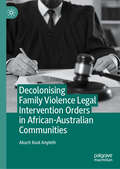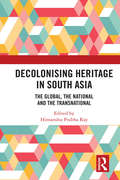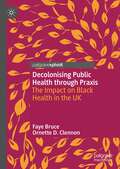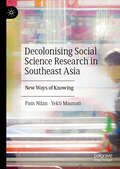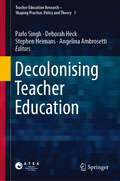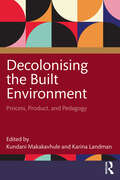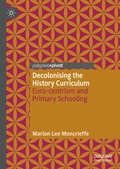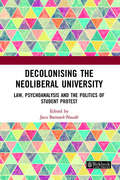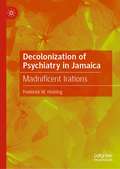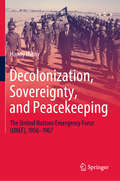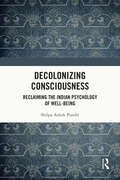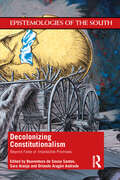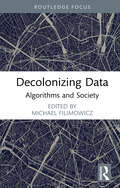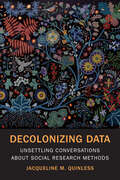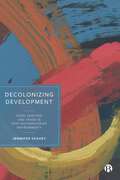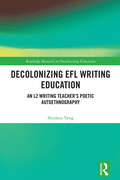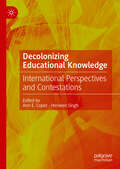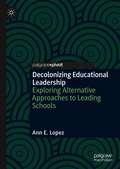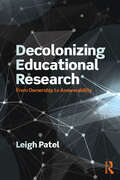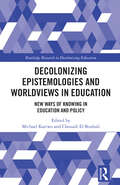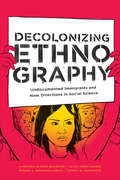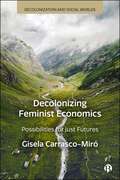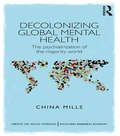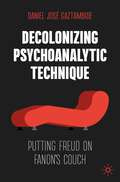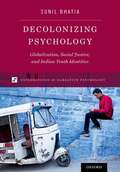- Table View
- List View
Decolonising Family Violence Legal Intervention Orders in African-Australian Communities
by Akuch Kuol AnyiethThis book presents an intersectional, decolonial analysis of family violence intervention/prevention within the African-Australians Communities in Victoria, Australia. It explores the experiences of Family Violence Intervention Orders (FVIOs), assessing their effectiveness as interventions and safeguards against family violence in the African-Australian Communities. It investigates the influence of African-Australians cultural practices on the understanding and application of FVIOs, as well as participants' proposed strategies for enhancing or aligning these legal interventions with existing African practices for preventing and managing family violence. The application of this intersectional approach plays a pivotal role in illuminating complexities of social history, culture, and identity that intersect with, and extend beyond, gender. This includes experiences of social conflict, migration, exclusion, and hardship. These factors complicated their experiences of family violence and added layers of intricacy when navigating the Australian legal system to seek legal protection through family violence intervention orders. The book documents these complexities in intersecting experiences of family violence, the cultural specificities of the Australian legal system's interventions in family matters, intervention orders, and the involvement of various services. It shows how the implementation of the FVIOs with little consideration for social and cultural context diminishes their effectiveness as tools to combat family violence and enhance safety within the African-Australian communities. This book speaks to family violence scholars and practitioners and to those interested in multicultural and migration studies and intersectional and decolonial methods more broadly.
Decolonising Heritage in South Asia: The Global, the National and the Transnational
by Himanshu RayThis volume cross-examines the stability of heritage as a concept. It interrogates the past which materialises through multi-layered narratives on monuments and other objects that sustain cultural diversity. It seeks to understand how interpretations of “monuments” as “texts” are affected at the local level of experience, even as institutions such as UNESCO work to globalise and fix constructs of stable and universal heritage. Shifting away from a largely Eurocentric concept associated with architecture and monumental archaeology, this book reassesses how local and regional heritage needs to be balanced with the global and transnational. It argues that material objects and monuments are not static embodiments of culture but are, rather, a medium through which identity, power and society are produced and reproduced. This is especially relevant in South and Southeast Asian contexts, where debates over heritage often have local, regional and national political implications and consequences. Reevaluating how traditional valuation of monuments and cultural landscapes could help aid sustainability and long-term preservation of the heritage, this book will be useful for scholars and researchers of South and Southeast Asian history, heritage studies, archaeology, cultural studies, tourism studies and political history as well.
Decolonising Public Health through Praxis: The Impact on Black Health in the UK
by Ornette D. Clennon Faye BruceThis book provides an interdisciplinary analysis of UK African Diaspora health seekers and their sustained health inequalities in the health market. It translates their often-silenced voices into a decolonial praxis, where their experiences illuminate the hidden factors that have blighted change in health outcomes for these communities. The book excavates and breaks down the nature of these hidden factors, as historical patterns of behaviour that comprise whiteness over the longue durée. Using the lenses of decolonial and critical race studies, the book places whiteness within an ethical and moral framework in order to examine the hidden factors behind health inequalities. The book also looks at intersectionality and discusses whether it is actually fit for purpose as an analytical framework for discussing the health seeking behaviours of both Black men and Black women in relation to their unequal access to the health market.
Decolonising Social Science Research in Southeast Asia: New Ways of Knowing
by Pam Nilan Yekti MaunatiThis book draws together some of the most innovative studies in contemporary Southeast Asian research by social science scholars in the region. Themes include gender, popular culture, democratic struggle, climate change and environment, minority representation, wealth and marginalisation, labour migration, and ASEAN – the Association of Southeast Asian Nations. Readers can glimpse, in a single volume, the nature and scope of the ground-breaking research being conducted across the diverse set of countries in the region. The authors have assembled a set of chapters that represent not only new insights, but new ways of knowing. The aim is to illuminate important steps in the decolonisation of social science research in Southeast Asia. This is an essential resource for all social science scholars and students who want to keep up with epistemological innovation across the Southeast Asian region.
Decolonising Teacher Education (Teacher Education Research – Shaping Practice, Policy and Theory #1)
by Angelina Ambrosetti Deborah Heck Parlo Singh Stephen HeimansThis book makes a deliberate attempt to explore the complexity of decolonising theories in teacher education. It draws attention to the historical and emerging impacts of colonialism on educational institutions and practices, challenging educators to expand their understanding of diverse trajectories of decolonial research both theoretically and practically. It adds to the discussions and dialogues between different disciplinary traditions, such as postcolonial and decolonial studies, as well as critical Indigenous and critical race studies. As an international compilation, it offers educators a unique opportunity to envision teacher education through alternative lenses—rethinking the relationship between ontology-epistemology-ethics, that is, what constitutes knowledge, how it is produced, and what material worlds are constructed in and through knowledge / research systems. Through compelling examples, this book illustrates how educators have navigated epistemic injustices within the field of teacher education amidst the rising global demands for standardisation. It encourages teacher educators to explore alternative theories within their own contexts, crafting new teacher education practices in universities and schools.
Decolonising the Built Environment: Process, Product, and Pedagogy
by Karina Landman Kundani MakakavhuleDecolonising the Built Environment: Process, Product, and Pedagogy provides an important and much-needed comprehensive overview of how decolonisation is shaping the built environment in theory, in practice, and as a process/project today. The contributors provide an inclusive and trans-national conversation between a diverse set of academics, design practitioners and thinkers, and activists. This book is structured around three thematic and practical categories: Part 1 studies decolonisation conceptually; Part 2 studies decolonisation as a process; and Part 3 studies the products of decolonisation as materialised in the form of buildings, urban design, planning, policy, and social practices.Essential reading for students, teachers, and practitioners, this book presents the project of decolonisation as a pedagogy and an ongoing process.
Decolonising the History Curriculum: Euro-centrism and Primary Schooling
by Marlon Lee MoncrieffeThis book calls for a reconceptualisation and decolonisation of the Key Stage 2 national history curriculum. The author applies a range of theories in his research with White-British primary school teachers to show how decolonising the history curriculum can generate new knowledge for all, in the face of imposed Eurocentric starting points for teaching and learning in history, and dominant white-cultural attitudes in primary school education. Through both narrative and biographical methodologies, the author presents how teaching and learning Black-British history in schools can be achieved, and centres his Black-British identity and minority-ethnic group experience alongside the immigrant Black-Jamaican perspective of his mother to support a framework of critical thinking of curriculum decolonisation. This book illustrates the potential of transformative thinking and action that can be employed as social justice for minority-ethnic group children who are marginalized in their educational development and learning by the dominant discourses of British history, national building and national identity.
Decolonising the Neoliberal University: Law, Psychoanalysis and the Politics of Student Protest
by Jaco Barnard-NaudéTaking the postcolonial – or, more specifically, the post-apartheid – university as its focus, the book takes the violence and the trauma of the global neoliberal hegemony as its central point of reference. Following a primarily psychoanalytic line of enquiry, it engages a range of disciplines – law, philosophy, literature, gender studies, cultural studies and political economy – in order better to understand the conditions of possibility of an emancipatory, or decolonised, higher education. And this in the context of both the inter-generational transmission of the trauma of colonialism, on the one hand, and, on the other, the trauma of neoliberal subjectivity in the postcolonial university. Oriented around an important lecture by Jacqueline Rose, the volume contains contributions from world-renowned authors, such as Judith Butler and Achille Mbembe, as well as numerous legal and other theorists who share their concern with interrogating the contemporary crisis in higher education. This truly interdisciplinary collection will appeal to a wide range of readers right across the humanities, but especially those with substantial interests in the contemporary state of the university, as well as those with theoretical interests in postcolonialism, psychoanalysis, gender studies, cultural studies, jurisprudence and law.
Decolonization of Psychiatry in Jamaica: Madnificent Irations
by Frederick W. HicklingThis book traces the historical postcolonial journey of four generations of Jamaican psychiatrists challenging the European colonial ‘civilizing mission’ of psychiatric care. It details the process of deinstitutionizing patients with chronic mental illness using psychohistoriographic cultural therapy, by engaging them in creating sociodrama and poetry writing, not only to express and reverse the stigma contributing to their marginalized status, but also to reconnect them to a centuries-long history of oppression. The author thereby demonstrates that psychological decolonization requires a seminal understanding of the complex mental inter-relationship between slaves and slaveowners. Further, it is shown how the model analyzes the antipodal dialectic history of descendants of Africans enslaved in the New World by brutish British Imperialists suffering from the European psychosis of white supremacy. Drawing together a detailed description of the sociopoem Madnificent Irations, with an examination of Jamaica’s political and social history, and the author’s personal experience, this compelling work marks an important contribution to decolonial literature. It will be of particular interest to students and scholars of postcolonial studies, critical race theory, the history of psychology and community psychology.
Decolonization, Sovereignty, and Peacekeeping: The United Nations Emergency Force (UNEF), 1956–1967
by Hanny HilmyThis book analyses three major themes: decolonization, sovereignty, and peacekeeping. Their interaction during the national liberation struggle during the Cold War, culminating in the 1956 Suez War, addresses the principle of national sovereignty after World War II in the framework of the UN Charter. The new peacekeeping operations were used in many conflicts, during which the Charter’s theory and application were tested. The rise of the USA as the key Western power and Israel’s special role in the Middle East have created a new confrontational dynamic for the entire region. The interaction between the book’s main themes in the field has led to the principles of peacekeeping in international and national conflicts being reviewed in light of the discredited ‘Capstone Doctrine’. The author argues that state sovereignty is sacrosanct, but humanitarian interventions are equally imperative in his view. Striking the right balance is crucial for managing conflicts. The author:· offers a well-informed historical account and an authoritative political analysis· was exposed to UNEF deployments and termination and knows key peacekeeping actors· draws on original documents, memoirs, and interviews· includes unpublished photos and previously unavailable documentary material · has experience in government and academia
Decolonizing Consciousness: Reclaiming the Indian Psychology of Well-being
by Shilpa Ashok PanditThe book intertwines several strands of scholarship in Indian Philosophy, contemporary psychology and the lived Indian psychological practice inclusive of Yoga, advaita, tantra and bhakti to engage in an exploration of consciousness, cognitive science and philosophy. The book examines the characteristics of consciousness by situating it in the historical and cultural contexts of Euro-American as well as Asian, particularly Indian philosophical tradition specifically, the Bhakti tradition and creative living. The volume decolonizes the understanding of the ecology of consciousness while accounting for the diverse strands, which have given us a unique understanding of the mind, psychology, cognition and philosophy of the mind. This book will be of interest to students, teachers, and scholars of psychology, consciousness studies, cognitive science, philosophy, social psychology, Yoga studies, and Yoga psychology. It will also be useful for Yoga professionals, social workers, therapists, and anyone who is interested to learn about consciousness.
Decolonizing Constitutionalism: Beyond False or Impossible Promises (Epistemologies of the South)
by Sara Araújo Orlando Aragón Andrade de Sousa Santos, BoaventuraThe modern state, law, and constitution result from a legal canon that (re)produces the abyssal lines dividing the world that is validated from the world whose humanity and epistemological validity are denied. This book aims to contribute to a post-abyssal reflection on law and constitutionalism by considering the structural axes of power that are constitutive of modern law “capitalism, colonialism, and heteropatriarchy” alongside the legal plurality of the world. Is it possible to decolonize, decommodify, and depatriarchalize the constitution? The authors speak from multiple geographies, raise different questions, resort to differentiated theoretical approaches, and reveal varying levels of optimism about the possibilities of transforming constitutions. The readers are confronted with critical perspectives on the Eurocentric legal canon, as well as with the recognition of anti-capitalist, anti-colonial, and anti-patriarchal legal experiences. The horizon of this publication is the expansion of the possibilities of legal and political imagination.
Decolonizing Data: Algorithms and Society (Algorithms and Society)
by Michael FilimowiczThis book focuses on the values and effects that are operational in data technologies as they sustain colonial and imperialist legacies while also highlighting strategies for resistance to autocratic regimes and pathways towards decolonizing efforts. Systems and schemes for databases and automated data flow processing often contain implicitly Westernized, autocratic or even imperialist features, but can also be appropriated for resistance and revolt. Algorithms are not strictly mathematical but also embody cultural constructs. Values circulate in systems along with labels and quantities. This entails more critically reflective data practices whether in government, academia, industry or the civic sphere. The volume covers a critique of the data colonialism thesis which frames computer science as a colonizing science that uses data to classify and govern us, an alternate framing of metadata as ‘data near data’ to challenge seemingly neutral technical terms, and a case study of the use of social media platforms in the 2018 Sudanese uprising. Scholars and students from many backgrounds, as well as policy makers, journalists and the general reading public will find a multidisciplinary approach to questions posed by data decolonization research from the fields of Communication and Digital Media studies.
Decolonizing Data: Unsettling Conversations about Social Research Methods
by Jacqueline M. QuinlessDecolonizing Data explores how ongoing structures of colonialization negatively impact the well-being of Indigenous peoples and communities across Canada, resulting in persistent health inequalities. In addressing the social dimensions of health, particularly as they affect Indigenous peoples and BIPOC communities, Decolonizing Data asks, Should these groups be given priority for future health policy considerations? Decolonizing Data provides a deeper understanding of the social dimensions of health as applied to Indigenous peoples, who have been historically underfunded in and excluded from health services, programs, and quality of care; this inequality has most recently been seen during the COVID-19 pandemic. Drawing on both western and Indigenous methodologies, this unique scholarly contribution takes both a sociological perspective and the "two-eyed seeing" approach to research methods. By looking at the ways that everyday research practices contribute to the colonization of health outcomes for Indigenous peoples, Decolonizing Data exposes the social dimensions of healthcare and offers a careful and respectful reflection on how to "unsettle conversations" about applied social research initiatives for our most vulnerable groups.
Decolonizing Development: Food, Heritage and Trade in Post-Authoritarian Environments
by Jennifer KeaheyPost-Soviet Latvia and post-apartheid South Africa are far apart geographically and yet have endured a similar history of colonial and authoritarian rule before transitioning to democracy at the end of the 20th century. This book examines these two nations in an unusual comparative study of post-authoritarian efforts to decolonize production and trade. The book combines an analysis of political economy and ecocultural heritage to unpack alternative trade formations. It also connects world systems thinking with Indigenous knowledge to articulate a decolonial theory of development and change over the longue durée. Conclusions and insights drawn are timely and important for a planet confronted by crises such as authoritarianism, laissez-faire capitalism, climate change and the COVID-19 pandemic.
Decolonizing EFL Writing Education: An L2 Writing Teacher's Poetic Autoethnography (Routledge Research in Decolonizing Education)
by Shizhou YangArguably the first book-length exploration of decolonizing English as a Foreign Language (EFL) writing education, this novel volume uses poetic autoethnography to provide a situated, dynamic, and complex view of multilingual writers through their second language (L2) academic writing and creative writing.Responding to contemporary calls to decolonize L2 writing as a field and diversify academic writing for multilingual students, this book is the first of its kind to explore the decolonization of EFL writing education from a Global Southern context. Chapters critically and creatively consider issues of educational technologies, translanguaging, academic writing, epistemology, and pedagogy from two writing courses from a Global South and classroom writing ecology perspective. Using poetic autoethnography alongside data from authentic writing classrooms in Thailand, the book posits that emergent translanguaging literature can be cultivated for decolonization purposes, critiquing and providing decolonial options in such areas as monolingual ideology, freewriting, student identity, and mind.Empowering EFL writing teachers to raise students’ critical awareness of issues such as writing, culture, and coloniality, this book will be of key interest to researchers, scholars, and postgraduate students in the fields of applied linguistics, Teaching English to Speakers of Other Languages (TESOL), L2 writing, multilingual education, and language policy and planning.
Decolonizing Educational Knowledge: International Perspectives and Contestations
by Ann E. Lopez Herveen SinghThis volume explores theories and practices of decolonizing education, drawing on international perspectives from scholars across the globe to engage new knowledges and build solidarities across different spaces. Decolonization is an ongoing process in which educators, community members, and practitioners alike have a stake in challenging Eurocentric paradigms and ways of knowing. The book showcases the contributions of praxis-oriented scholars and practitioners who seek to engage in decolonizing praxis that unsettles educational norms, forging new ways of thinking about teaching, learning, and leadership.
Decolonizing Educational Leadership: Exploring Alternative Approaches to Leading Schools
by Ann E. LopezThis book offers new ways of engagement for leaders seeking to connect theory to practice in decolonizing education. In the current climate where xenophobia, anti-immigrant sentiments, and other forms of exclusion make up much of the discourse, educational leaders need to seek ways to foreground other forms of knowledge and transfer them into their daily leadership practices. Lopez contributes to other critical leadership approaches while foregrounding a decolonizing approach that unsettles the coloniality manifested in education and school practices. Chapters provide school leaders with examples of ways they can challenge coloniality, white supremacy, and other forms of oppression in schooling that negatively impact some students and their educational outcomes.
Decolonizing Educational Research: From Ownership to Answerability (Series in Critical Narrative)
by Leigh PatelDecolonizing Educational Research examines the ways through which coloniality manifests in contexts of knowledge and meaning making, specifically within educational research and formal schooling. Purposefully situated beyond popular deconstructionist theory and anthropocentric perspectives, the book investigates the longstanding traditions of oppression, racism, and white supremacy that are systemically reseated and reinforced by learning and social interaction. <P><P>Through these meaningful explorations into the unfixed and often interrupted narratives of culture, history, place, and identity, a bold, timely, and hopeful vision emerges to conceive of how research in secondary and higher education institutions might break free of colonial genealogies and their widespread complicities.
Decolonizing Epistemologies and Worldviews in Education: New Ways of Knowing in Education and Policy (Routledge Research in Decolonizing Education)
by Chouaib El Bouhali Michael KariwoThis edited volume examines the decolonization of worldviews and ways of knowing in education and educational policy. It critically challenges the Western interpretation of epistemology and ontology, providing a platform for contributors to demonstrate how concepts of decolonization, knowledge and worldviews are understood, as well as the impact of these understandings in creation of policies and practices in education and pedagogy. It also offers insight into related themes on student resilience, English language, the internationalization of western knowledge, indigenous paradigms, and curriculum transformation. Chapter authors present new understandings of decolonizing knowledge and diversity, analysis of non-Western and indigenous epistemologies and worldviews, and examples of implementation of equity in policy and education through case studies. Creating and initiating a platform for wider debate, it will ultimately appeal to scholars, researchers, policy makers and educational leaders concerned with decolonizing education and policy in North America and beyond, and with interests in indigenous education, decolonizing education, sociology of education, and philosophy of education.
Decolonizing Ethnography: Undocumented Immigrants and New Directions in Social Science
by Daniel M. Goldstein Carolina Alonso Bejarano Lucia López Juárez Mirian A. Mijangos GarcíaIn August 2011, ethnographers Carolina Alonso Bejarano and Daniel M. Goldstein began a research project on undocumented immigration in the United States by volunteering at a center for migrant workers in New Jersey. Two years later, Lucia López Juárez and Mirian A. Mijangos García—two local immigrant workers from Latin America—joined Alonso Bejarano and Goldstein as research assistants and quickly became equal partners for whom ethnographic practice was inseparable from activism. In Decolonizing Ethnography the four coauthors offer a methodological and theoretical reassessment of social science research, showing how it can function as a vehicle for activism and as a tool for marginalized people to theorize their lives. Tacking between personal narratives, ethnographic field notes, an original bilingual play about workers' rights, and examinations of anthropology as a discipline, the coauthors show how the participation of Mijangos García and López Juárez transformed the project's activist and academic dimensions. In so doing, they offer a guide for those wishing to expand the potential of ethnography to serve as a means for social transformation and decolonization.
Decolonizing Feminist Economics: Possibilities for Just Futures (Decolonization and Social Worlds)
by Gisela Carrasco-MiróDespite the urgency to understand how 'other' cultures encounter 'the West' in academic and political spheres, feminist economics has yet to tackle critiques from postcolonial and decolonial feminists about Western-centric modernism in the field. This book introduces a decolonizing approach to feminist economics, offering insights that move beyond the boundaries of modern Eurocentrism. The author explores the relationship between colonialism, capitalism, heteropatriarchy and ecological degradation, while offering critical feminist and decolonizing tools. By investigating global struggles, the author illuminates our hijacked present and imagines a decolonizing feminist economic landscape that is under transformation. Transdisciplinary and innovative, this book fills a vital gap by exploring the interplay between decolonization and feminist economics, challenging the growth logic, capitalism and Western-centrism, and imagining new possibilities for more just futures.
Decolonizing Global Mental Health: The psychiatrization of the majority world (Concepts for Critical Psychology)
by China MillsDecolonizing Global Mental Health is a book that maps a strange irony. The World Health Organization (WHO) and the Movement for Global Mental Health are calling to ‘scale up’ access to psychological and psychiatric treatments globally, particularly within the global South. Simultaneously, in the global North, psychiatry and its often chemical treatments are coming under increased criticism (from both those who take the medication and those in the position to prescribe it). The book argues that it is imperative to explore what counts as evidence within Global Mental Health, and seeks to de-familiarize current ‘Western’ conceptions of psychology and psychiatry using postcolonial theory. It leads us to wonder whether we should call for equality in global access to psychiatry, whether everyone should have the right to a psychotropic citizenship and whether mental health can, or should, be global. As such, it is ideal reading for undergraduate and postgraduate students, as well as researchers in the fields of critical psychology and psychiatry, social and health psychology, cultural studies, public health and social work.
Decolonizing Psychoanalytic Technique: Putting Freud on Fanon's Couch
by Daniel José GaztambideBoth new and seasoned psychotherapists wrestle with the relationship between psychological distress and inequality across race, class, gender, and sexuality. How does one address this organically in psychotherapy? What role does it play in therapeutic action? Who brings it up, the therapist or the patient? Daniel José Gaztambide addresses these questions by offering a rigorous decolonial approach that rethinks theory and technique from the ground up, providing an accessible, evidence-informed reintroduction to psychoanalytic practice. He re-examines foundational thinkers from three traditions—Freudian, relational-interpersonal, and Lacanian—through the lens of revolutionary psychiatrist Frantz Fanon, and offers a detailed analysis of Fanon’s psychoanalytic practice. Drawing on rich yet grounded discussions of theory and research, Gaztambide presents a clinical model that facilitates exploration of the social in the clinical space in a manner intimately related to the patient’s presenting problem. In doing so, this book demonstrates that clinicians no longer have to choose between attending to the personal, interpersonal, or sociopolitical. It is a guide to therapeutic action “on the couch,” which envisions political action “off the couch” and in the streets. Decolonizing Psychoanalytic Technique provides a comprehensive, practice-oriented and compelling guide for students, practitioners, and scholars of critical, multicultural and decolonial approaches to psychotherapy.
Decolonizing Psychology: Globalization, Social Justice, And Indian Youth Identities
by Sunil BhatiaIn recent years, the news media has directed a significant amount of attention to the effect of globalization on the second most populous nation in the world: India. With the emergence of new economic opportunities and the influx of foreign popular culture and commodities, India has experienced an enormous sea of change in the last few decades. In Decolonizing Psychology: Globalization, Social Justice, and Indian Youth Identities, author Sunil Bhatia focuses on the psychological tensions that these changes have brought upon Indian youth today.
